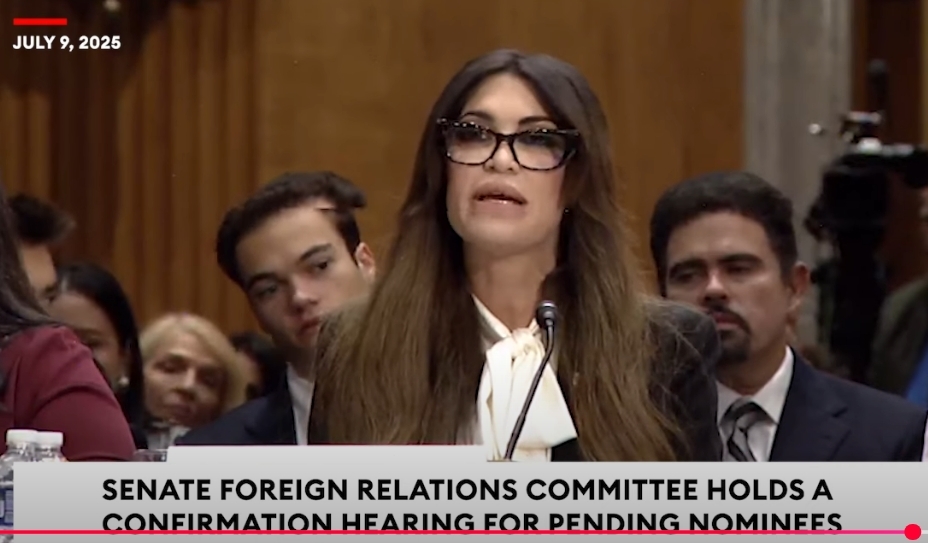The Trump administration’s nominee for the next US ambassador to Greece, Kimberly Guilfoyle, fielded questions at Wednesday morning’s (EST) US Senate Foreign Relations Committee confirmation hearing.
Approval by the committee’s members, all serving US Senators, is the last step before her confirmation is voted on by the Senate’s plenum.
Questions by Senate committee members and Guilfoyle’s answers, beginning at 42.17 minutes.
During the course of the hearing, she was first asked about the “3+1” cooperation between Greece, Israel, Cyprus, along with the US, which she committed to advancing and supporting.
She called Greece’s location in southeast Europe as “pivotal”, citing the transportation of US citizens stranded in Israel with Greek support, “our partners and allies… through Cyprus and Greece.”
She was then asked about naval support activity, and specifically about the Souda Bay anchorage near Chania, Crete, which she called the “largest US military base in Greece. Strategically critical to the United States.”
Touching on energy issues, she mentioned the Revithousa and Alexandroupolis LNG terminals by name, with Sen. John Barrasso (R-Wyoming) saying he first appreciating her answer and then saying he believes Greece is “quickly become an energy hub in the eastern Mediterranean”, while mentioning US energy giants exploring for hydrocarbons in Greek waters.
In her introductory statement, Guilfoyle praised the role of the Greek-American community in the United States, as well as Greece’s economic growth. She also referred to her respect for Christian Orthodoxy, the prevalent religion in Greece, while touching on religious freedom. As expected, she said she’ll work for closer relations between the two peoples.
Guilfoyle’s introductory statement
Guilfoyle also praised Greece’s geopolitical significance, calling it a “pillar of stability” in a complex region, while she stressed its crucial role in the NATO Alliance. She underlined that Greece is among the top NATO countries in terms of defense spending within the Alliance, with a projection of 3% of GDP in 2025 and a subsequent target of 5%, in line with The Hague commitments.
Guilfoyle referred to a handful of “marquee” purchases of US-made weapons systems – such as the F-35 fighter planes, Apache and Blackhawk helicopters, along with modern surface vessels – mentioning, in fact, the importance of the joint Constellation frigate co-production project, which she said will strengthen US-Greece industrial cooperation. Along these lines, she cited a priority to further boost the modernisation of Greece’s armed forces.
Guilfoyle on Turkey’s purchase of S400 anti-aircraft system
Referring to Erdogan-led Turkey’s purchase of the Russian-made S400 anti-aircraft missile defense systems, she said the development raises serious concerns about Ankara’s alignment with NATO’s strategic objectives, in response to a question from Sen. James E. Risch (R-Idaho), who asked about Greek-Turkish tensions and the potential sale of F-35 jets to Ankara.
Sen. Risch: No to F-35s for Turkey
Guilfoyle repeated that her approach is to focus on promoting stability and strengthening strategic partnerships in the region. On his part, the chairman of the committee, Sen. Risch, added that the US Senate would continue to block the sale of F-35 warplanes to Turkey, while Guilfoyle responded that she will work closely with US Ambassador to Ankara Jeff Barak, whereas she had a fruitful cooperation with the previous US Ambassador to Greece, George Tsunis.
